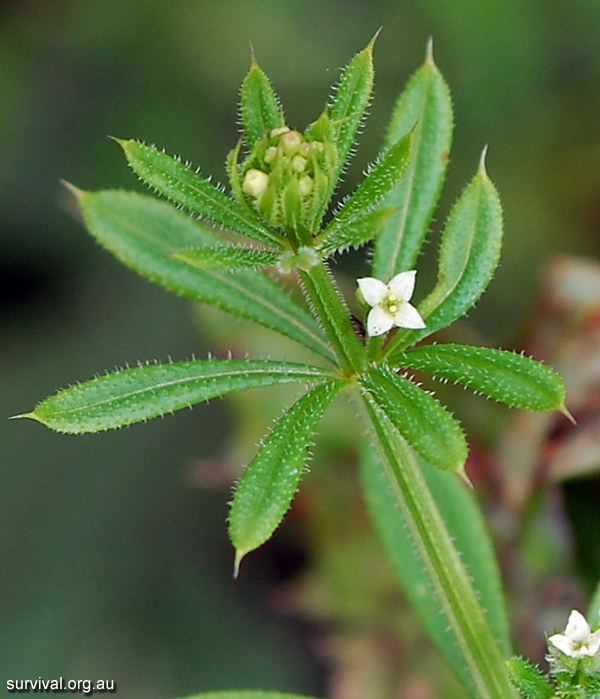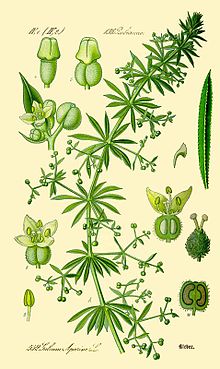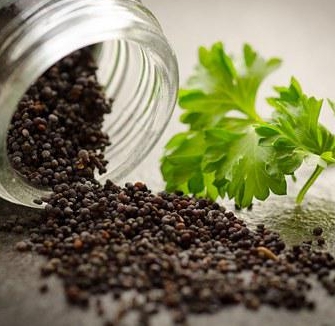
It’s starting to feel more like winter here in Colorado. We have been busy in the store making yummy tummy tea to help you keep warm and cold remedy teas to help nip those nasty colds in the bud.
Cleavers is an herb that I recently had the pleasure to explore.
I woke up one Monday with a huge swollen lymph node in my neck. I had never experienced anything like it before and I have to say it worried me a little bit! Well I chatted with the wonderful ladies at the apothecary and we made up a tea with cleavers, burdock, echinacea, and yarrow (mostly cleavers). I drank a quart of this tea twice a day and by the end of the week my lymph node was back to normal! I have to say it felt like a miracle but I knew these wonderful herbs had done the job, and an amazing one at that. Cleavers has been used for many things throughout history, and I have to say it’s now one of my favorite.

The use of cleavers is dated back to ancient greeks, who often wove it together to make a sieve for straining milk, which added healing properties to the milk. This method of straining milk is still being used in some parts of Sweden today.
Cleavers were often used for making mattresses and pillows which is where the name bedstraw came from. It is thought that Virgin Mary prepared the manger by placing cleavers in it for baby Jesus to lay.
In traditional folk medicine cleavers was used for skin disorders or injuries. It was also often used as a cleansing herb and is still known today as a “spring cleaning” herb, as it flushes toxins out of the body and promotes a cooling effect.
MATERIA MEDICA: CLEAVERS

Latin Name: Galium aparine, G. trifida, G. triflorum, G. verum
Family: Rubiaceae (Madder Family
Parts Used: Above ground plant
Actions: Alterative, anti-inflammatory, antineoplastic, aperient, astringent (mild), diaphoretic, diuretic, febrifuge, hypotensive, immune tonic, lithotriptic, lymphatic cleanser, nutritive, refrigerant, tonic, vulnerary.
Preparations and Dosage:
- Cooking: Cleavers tend to have a bitter taste to them so cooking them in a soup or stew is typically the best method of cooking with them. Cleavers can be ground up into a powder form and added to soups which adds a very nice earthy flavor to the broth! Use 3-4 Tbs in 3 quarts of broth and add whatever delicious soup fixin’s you would like! If found fresh they can be cooked
- Tea: 1-2 Tbs. in 8-12oz of water. Steep for 15 minutes, strain, and enjoy!
- Topically: Prepared as a compress, poultice, or salve to help treat burns, cancer, eczema, poison ivy, psoriasis, sagging skin, scars, sore nipples, spider bites, stretch marks, sunburn, and wounds. When prepared as a hair rinse it can help treat dandruff. It can be used as a toner to help treat acne, and as a mouthwash to help treat canker sores and throat ulcers.
- Tincture: 15-30 drops, 1-3 times a day.
Uses
Treat acne, appetite loss, arthritis, bedwetting, bladder stones, cancer, cystitis, dysuria, edema, eczema, epilepsy, glandular fever, hepatitis, hypertension, kidney stones, mastitis, measles, ovarian cysts, prostatitis, psoriasis, scarlet fever, scrofula, scurvy, sore throat, swollen adenoids, swollen lymph glands, throat cancer, tonsillitis, tumors, ulcer, and venereal disease.
Cautions: The use of cleavers is not recommended in cases of diabetes, as it is known to increase urination.
Written by apothecary intern Suzy Ringdahl

Don’t Miss a Thing!
Enter your email below to be the first to know about sales, new products and tips for taking care of your pieces.

